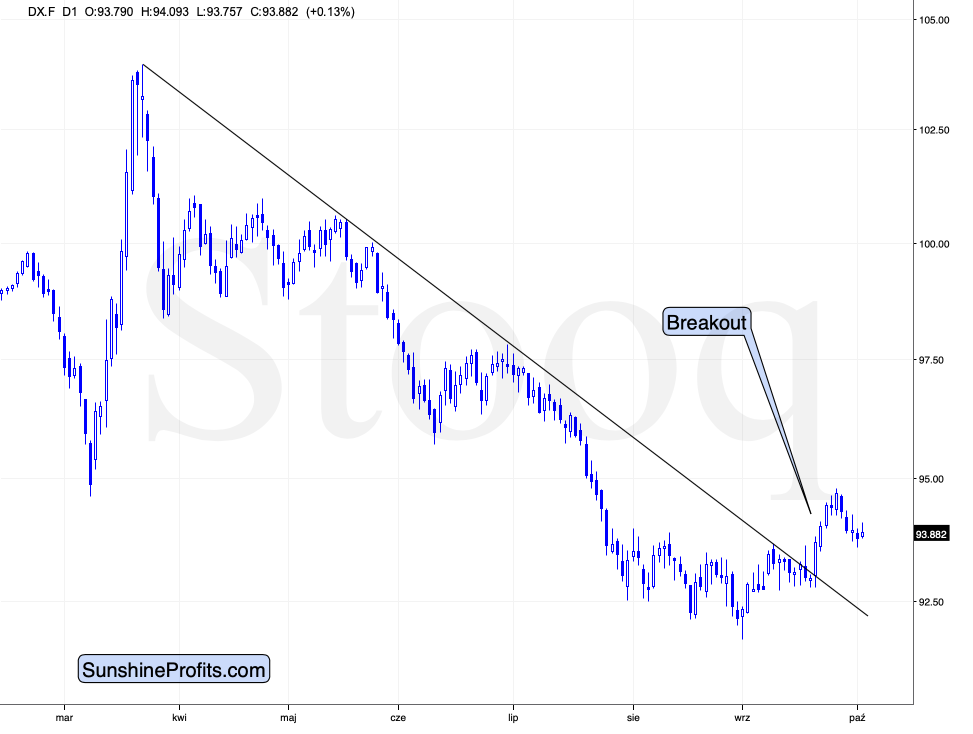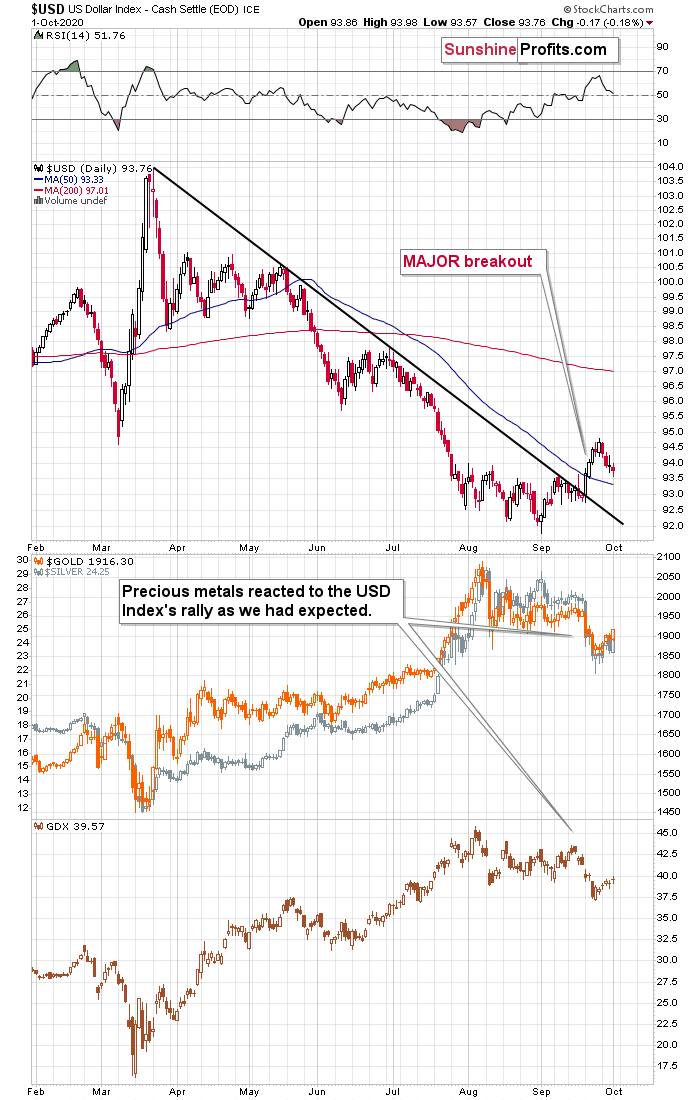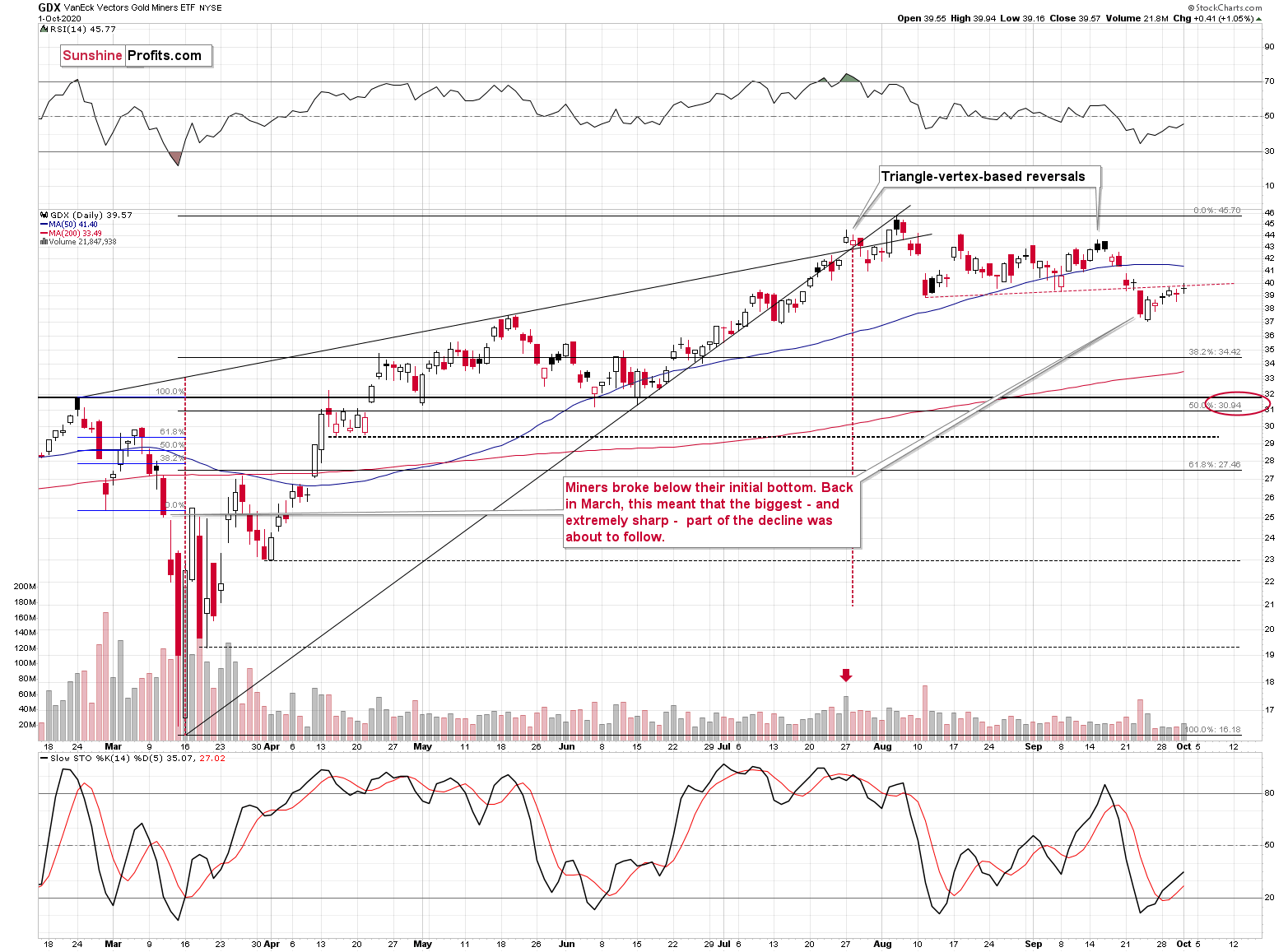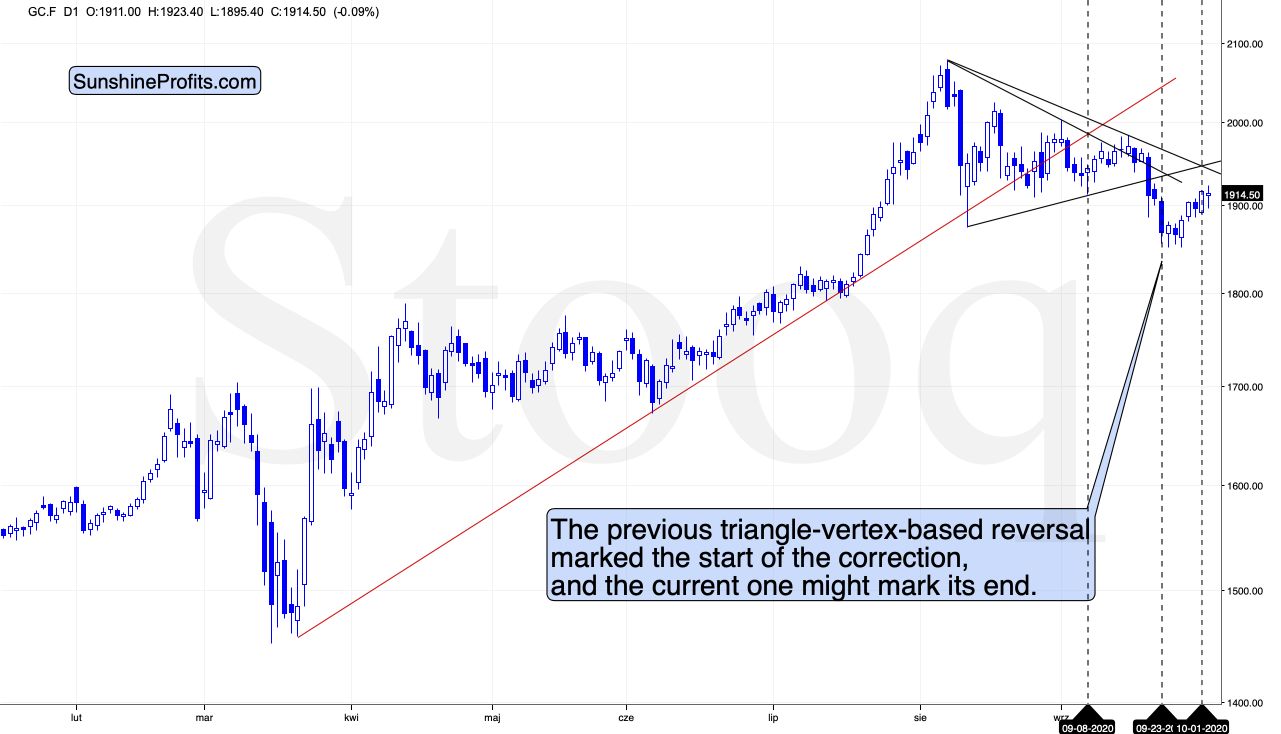Briefly: in our opinion, full (300% of the regular position size) speculative short positions in mining stocks are justified from the risk/reward point of view at the moment of publishing this Alert.
The big news of the day is that the U.S. President - Donald Trump, and the First Lady - Melania Trump, had both tested positive for Covid-19. If the markets were waiting on any trigger that the situation is about to worsen - this might be it. In the last several hours, crude oil and stocks have declined, making the entire situation more and more similar to what we have witnessed in March.
And what followed in March? A massive slide in the precious metals market that was then followed by a robust rebound afterward. In the present case, we expect history to repeat itself one more time again.
As far as price action is concerned, it's in tune with the news mentioned above and the technical indications that we had seen previously.
Regarding the USD Index's short-term chart, previously, we've indicated the following:
Last week, the USD Index was just starting to break above the declining resistance line. We wrote that the situation doesn't become crystal-bullish, unless we see a confirmation of the breakout in the form of either a significant move above the resistance (it's not significant so far), or three consecutive daily closes above it.
That's exactly what we saw. The breakout is more than confirmed. We didn't saw a corrective decline, but rather, we've witnessed a pause. So, will we see a pullback soon? That's quite possible, but definitely not inevitable. Such a decline could trigger a rally in gold, but we don't think that any of these moves would be significant.
As it turns out, that's precisely what we've witnessed this week.
The USDX moved slightly lower, while gold, silver, and mining stocks moved marginally higher. And then we saw a pause in all of them. However, the sizes of these moves were not particularly significant.
Just as the USD Index paused, the same happened in gold, silver, and mining stocks. Gold moved a bit above its very recent highs yesterday, but the move was tiny. The same happened when it comes to miners. Silver didn't manage to move above its very short-term highs. All in all, after a substantial short-term decline, the markets took a breather, appearing to be ready to move lower once again.
The above GDX ETF chart points out that miners still closed the day below the red resistance line despite gold's move higher. So, did the most recent upswing made the outlook bullish even for the short term? Not really.
In other words, practically everything that I wrote yesterday and in Monday's extensive analysis still applies - for the next several weeks, the outlook for the precious metals market remains bearish.
Before summarizing, let's answer the question that you're likely wondering about the most - when will this correction end?
The simple answer is that it's relatively unclear, but also, it could be the case that it has already ended.
The short-term triangle-vertex-based reversals were quite useful in timing the final moments of the given short-term moves in the past few weeks. Please keep in mind that the early and late September lows developed when the support and resistance lines were crossed.
We can see the same thing happening once more. Based on the recent highs and lows, yesterday, the support and resistance lines both crossed again. And indeed, gold is trading below yesterday's closing price in today's pre-market trading.
Now, this technique might not work on a precise basis, but rather on a near-to basis, and given the highly political character of the current month (before the U.S. presidential elections), things might move in a somewhat chaotic manner... But still, this technique worked multiple times in the previous months and years, and it has worked recently as well. It seems quite likely that the days of this corrective upswing are numbered.
Overview of the Upcoming Decline
As far as the current overview of the upcoming decline is concerned, I think it has already begun.
During the final part of the slide (which could end later than in 6 weeks, perhaps near the end of the year - just like it happened in 2015), we expect silver to decline more than miners. That would be aligned with how the markets initially reacted to the Covid-19 threat.
The impact of all the new rounds of money printing in the U.S. and Europe on the precious metals prices is incredibly positive in the long run, but it doesn't make the short-term decline improbable. Markets can and will get ahead of themselves and then decline - sometimes very profoundly - before continuing their upward march.
The plan is to exit the current positions in miners after they decline far and fast, but at the same time, silver drops just "significantly" (we expect this to happen in 0 - 5 weeks). In other words, the decline in silver should be severe, but the decline in the miners should look "ridiculous". That's what we did in March when we bought practically right at the bottom. It is a very soft and broad instruction, so additional confirmations are necessary.
I expect this confirmation to come from gold, reaching about $1,800. If - at the same time - gold moves to about $1,800 and miners are already after a ridiculously big drop (say, to $31 - $32 in the GDX ETF - or lower), we will probably exit the short positions in the miners and at the same time enter short positions in silver. It will be tempting to wait with opening the short position in silver until the entire sector rebounds, but such a rebound could last only a couple of hours, so it would be challenging to successfully execute such a strategy.
The precious metals market's final bottom is likely to take shape when gold shows significant strength relative to the USD Index. It could take the form of a gold's rally or a bullish reversal, despite the ongoing USD Index rally.
Summary
Summing up, considering gold's breakout invalidation above the 2011 highs, it's clear that the rally (that ended $4 above our upside target) is entirely over. Given this invalidation and the confirmed USD Index breakout, gold will probably slide much lower over the next few weeks. That may (based on miners' breakdown) or may not (based on gold's triangle-vertex-based reversal) happen right away. Or, it will take place after several days of pause or a small correction, but it will most probably happen.
Naturally, everyone's trading is their responsibility. But in our opinion, if there ever was a time to either enter a short position in the miners or increase its size if it wasn't already sizable, it's now. We made money on the March decline, and on the March rebound, with another massive slide is already underway.
After the sell-off (that takes gold to about $1,700 or lower), we expect the precious metals to rally significantly. The final decline might take as little as 1-6 weeks, so it's important to stay alert to any changes.
Most importantly, please stay healthy and safe. We made a lot of money on the March decline and the subsequent rebound (its initial part) price moves (and we'll likely earn much more in the following weeks and months), but you have to be healthy to really enjoy the results.
As always, we'll keep you - our subscribers - informed.
To summarize:
Trading capital (supplementary part of the portfolio; our opinion): Full speculative short positions (300% of the full position) in mining stocks is justified from the risk to reward point of view with the following binding exit profit-take price levels:
Senior mining stocks (price levels for the GDX ETF): binding profit-take exit price: $32.02; stop-loss: none (the volatility is too big to justify a SL order in case of this particular trade); binding profit-take level for the DUST ETF: $28.73; stop-loss for the DUST ETF: none (the volatility is too big to justify a SL order in case of this particular trade)
Junior mining stocks (price levels for the GDXJ ETF): binding profit-take exit price: $42.72; stop-loss: none (the volatility is too big to justify a SL order in case of this particular trade); binding profit-take level for the JDST ETF: $21.22; stop-loss for the JDST ETF: none (the volatility is too big to justify a SL order in case of this particular trade)
For-your-information targets (our opinion; we continue to think that mining stocks are the preferred way of taking advantage of the upcoming price move, but if for whatever reason one wants / has to use silver or gold for this trade, we are providing the details anyway. In our view, silver has greater potential than gold does):
Silver futures downside profit-take exit price: unclear at this time - initially, it might be a good idea to exit, when gold moves to $1,703.
Gold futures downside profit-take exit price: $1,703
Long-term capital (core part of the portfolio; our opinion): No positions (in other words: cash
Insurance capital (core part of the portfolio; our opinion): Full position
Whether you've already subscribed or not, we encourage you to learn how to make the most of our alerts and read our answers to the most common alert-and-gold-trading-related-questions.
Please note that in the trading section we describe the situation for the day that the alert is posted on. In other words, if we are writing about a speculative position, it means that it is valid on the day it was posted on. We are also featuring the initial target prices, so that you can decide whether keeping a position on a given day is something that is in tune with your approach (some moves are too small for medium-term traders and some might appear too big for day-traders).
Additionally, you might want to read why our stop-loss orders are usually relatively far from the current price.
Please note that a full position doesn't mean using all of the capital for a given trade. You will find details on our thoughts on gold portfolio structuring in the Key Insights section on our website.
As a reminder - "initial target price" means exactly that - an "initial" one. It's not a price level at which we suggest closing positions. If that becomes the case (like it did in the previous trade) we will refer to these levels as levels of exit orders (exactly as we've done previously). Stop-loss levels, however, are naturally not "initial", but something that, in our opinion, might be entered as an order.
Since it is impossible to synchronize target prices and stop-loss levels for all the ETFs and ETNs with the main markets that we provide these levels for (gold, silver and mining stocks - the GDX ETF), the stop-loss levels and target prices for other ETNs and ETF (among other: UGLD, DGLD, USLV, DSLV, NUGT, DUST, JNUG, JDST) are provided as supplementary, and not as "final". This means that if a stop-loss or a target level is reached for any of the "additional instruments" (DGLD for instance), but not for the "main instrument" (gold in this case), we will view positions in both gold and DGLD as still open and the stop-loss for DGLD would have to be moved lower. On the other hand, if gold moves to a stop-loss level but DGLD doesn't, then we will view both positions (in gold and DGLD) as closed. In other words, since it's not possible to be 100% certain that each related instrument moves to a given level when the underlying instrument does, we can't provide levels that would be binding. The levels that we do provide are our best estimate of the levels that will correspond to the levels in the underlying assets, but it will be the underlying assets that one will need to focus on regarding the signs pointing to closing a given position or keeping it open. We might adjust the levels in the "additional instruments" without adjusting the levels in the "main instruments", which will simply mean that we have improved our estimation of these levels, not that we changed our outlook on the markets. We are already working on a tool that would update these levels on a daily basis for the most popular ETFs, ETNs and individual mining stocks.
Our preferred ways to invest in and trade gold along with the reasoning can be found in the how to buy gold section. Additionally, our preferred ETFs and ETNs can be found in our Gold & Silver ETF Ranking.
As a reminder, Gold & Silver Trading Alerts are posted before or on each trading day (we usually post them before the opening bell, but we don't promise doing that each day). If there's anything urgent, we will send you an additional small alert before posting the main one.
Thank you.
Sincerely,
Przemyslaw Radomski, CFA
Editor-in-chief, Gold & Silver Fund Manager







